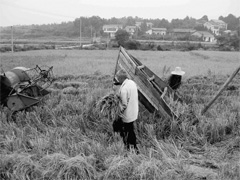Ximaojia Universe
 CHINA / 2009 / Chinese / Color / Video / 76 min
CHINA / 2009 / Chinese / Color / Video / 76 min
Director, Photography, Editing: Mao Chenyu
Producer: Xiang Hua
Co-producer: Zhang Yaxuan
Production Company, Source: Second Text Laboratory
www.paddyfilm.org
In Yueyang, Hunan Province, the Ximao clan, a group of 20-odd individuals from 11 families forms what amounts to a village. The Hunan-born director, both as a member of the community and as a filmmaker, actively intervenes in the archaeological archival work that links the relics of the past, people living today, and a future history. At times, he recreates things that have vanished. Referencing the worldview passed down through the daily lives, myths, and traditions of these people, this grand experimental ethnographic documentary attempts a new interpretation.
[Director’s Statement] I have always worked around rice paddies. I call my films related to the thought and spirit of rice “paddy films.” When I first started making documentaries, I came across on the Internet a Japanese director who toiled over planting rice for several years in order to film the paddies. The films he spent so many years making presented a long scroll of the landscape of Japanese rural society, through the story of rice. His name was Ogawa Shinsuke. Mr. Ogawa’s work gave me an earnest revelation: that the purpose and significance of filmmaking lies in an unknown universe, and the constructive will to live a creative life is stored in that universe.
If we throw ourselves headlong into this age of dwarfed thoughts and utilitarianism, we may perhaps feel an inexpressible joy. But we will surely miss hearing many voices of sincerity. For this reason, Mr. Ogawa stands as an unshakeable standard for my philosophy of filmmaking.
In bringing my equipment into China’s vast rural society, I needed a sufficient amount of sincerity and simplicity. The sense of happiness that this equipment can provide can also warn: For the sake of a peripheral society on the brink of collapse, you’ve got to act with a strong will and make a film that has something of a conscience and an abundance of good will. Hence, I chose a path that requires determination: to depict the diversity of history.
In 2008, I had a major operation to remove a tumor. After the operation, I realized that I yearned for my hometown very much, so I started filming Ximaojia Universe. Life is sometimes like a stalk of rice. I looked at my serious illness as a calamity that befell my stalk of rice. Though there’s no more important event than to know “I’m alive,” how insignificant an individual’s fate is in the face of history. Suddenly, I realized that, fortunately, I have always been seeking to move forward: My peasant birth, with rice in my genes; getting an education; and my absolute resistance to commonplace expression. I am not overly attached to life, but as long as I have been given life, I am determined to shoulder history.
It appears some happiness has been stored in my heart. I feel that happiness as I write these words.
 Mao Chenyu
Mao Chenyu
Born in Hunan Province, Mao graduated as an engineering major from Tongji University in Shanghai in 2000. Since then he has been engaged in anthropological film production. He established the Second Text Laboratory in 2006 to continue the practice of his film concepts, representing the diversity of ethnic groups and restoring the absence of history. His films include the documentaries Soul Mountain (2004), Human, Ghost, God (2005), A Story of Zeng Wuhua (2006), The Tale of Making a Vow (2008), and The Tale of Zhenyuan County (2008); and the fiction films Da Jiang Meeting a Ghost (2007) and The Tale of Two Sisters (2007). |
